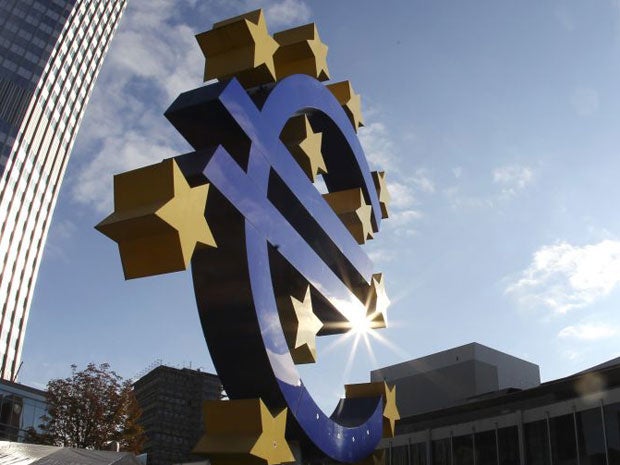
Your support helps us to tell the story
From reproductive rights to climate change to Big Tech, The Independent is on the ground when the story is developing. Whether it's investigating the financials of Elon Musk's pro-Trump PAC or producing our latest documentary, 'The A Word', which shines a light on the American women fighting for reproductive rights, we know how important it is to parse out the facts from the messaging.
At such a critical moment in US history, we need reporters on the ground. Your donation allows us to keep sending journalists to speak to both sides of the story.
The Independent is trusted by Americans across the entire political spectrum. And unlike many other quality news outlets, we choose not to lock Americans out of our reporting and analysis with paywalls. We believe quality journalism should be available to everyone, paid for by those who can afford it.
Your support makes all the difference.Investors ran for cover today as fears that Spain was next in line for a full-blown government bailout intensified.
The FTSE 100 Index was more than 2% or 131 points lower at 5520 amid speculation that a raft of Spanish regions were poised to ask for government bailout funds, increasing the likelihood that the country itself will turn to the EU for help.
The yield on 10-year Spanish bonds rose to a euro-era high of 7.5% in a sign that investor confidence in the country's ability to control its finances is increasingly waning.
The pound continued to soar against the battered euro, hitting 1.28, as the eurozone debt problems drove investors to the relative safe haven of the UK currency.
Vincent Forest, economist at the Economist Intelligence Unit, said: "It is now clear that Spain has entered a self-defeating cycle of austerity and economic contraction."
But borrowing costs also rose in Italy, which has been caught up in fears that it may soon be pushed into asking for assistance as well.
Italy's economy is stagnating and markets are worried that it may soon not be able to maintain its debt burden of €1.9 trillion (£1.5 trillion).
Greece also returned to focus as officials from the EU, European Central Bank (ECB) and International Monetary Fund (IMF) prepared to meet with the country's government to discuss progress with its budget pledges.
If Greece is unable to deliver the spending cuts and tax reforms necessary then the so-called troika are unlikely to be forthcoming with further aid and a Greek exit from the single currency bloc will be back on the cards.
David Jones, chief market strategist at IG Index, said: "Those of a superstitious nature may be drawing parallels with this time last year, when heightened concerns about Greece saw the FTSE lose 1000 points in the first two weeks of August.
"There is nothing to suggest that today's slide heralds a drop of this magnitude, but traditional low summer volumes could well accentuate market nerves in the days ahead."
Spain has already been granted a €100 billion (£80 billion) bailout for its banks, but has so far avoided following in the footsteps of Greece, Ireland and Portugal and taking EU assistance for the country.
But the Valencia region on Friday said it would be the first to seek financial help from an €18 billion (£14 billion) fund set up to help the country's regions.
And Murcia's government on Sunday said it was "studying whether to apply" for assistance.
To heap more pressure on the country, the Bank of Spain said the country's economy contracted by 0.4% in the three months to the end of June, having shrunk by 0.3% in the previous quarter.
PA
Join our commenting forum
Join thought-provoking conversations, follow other Independent readers and see their replies
Comments